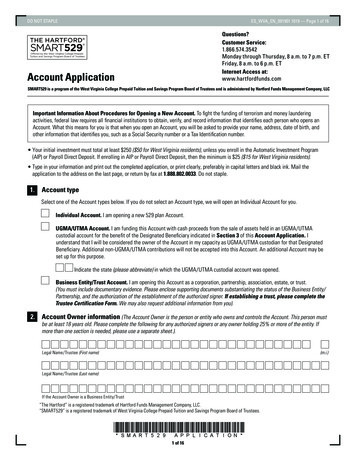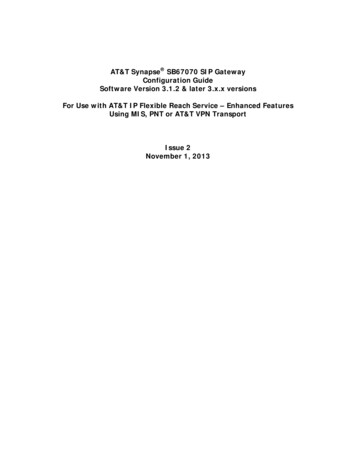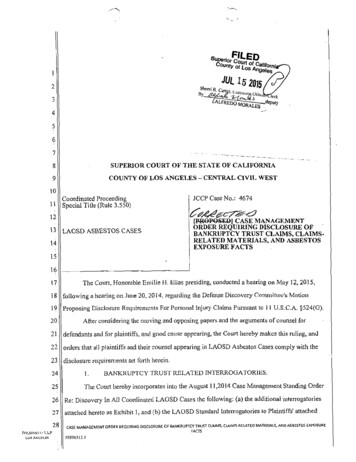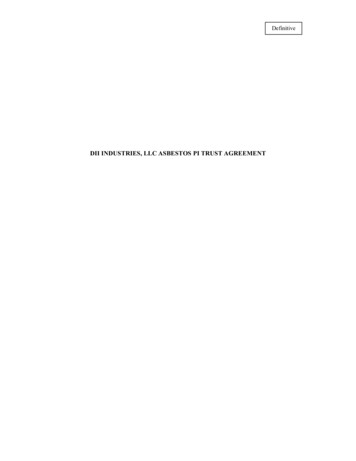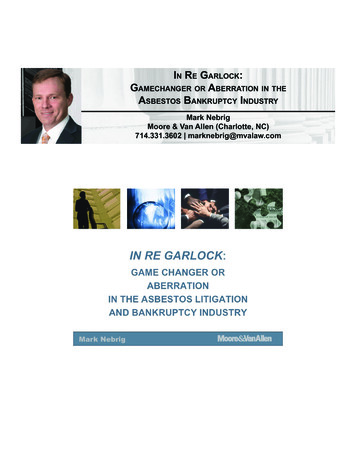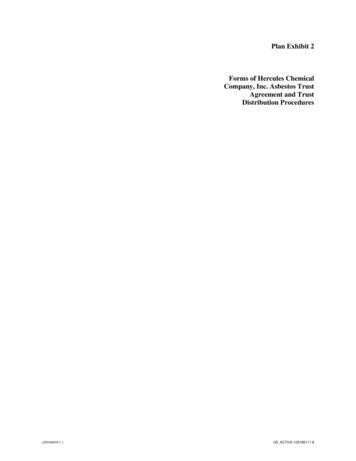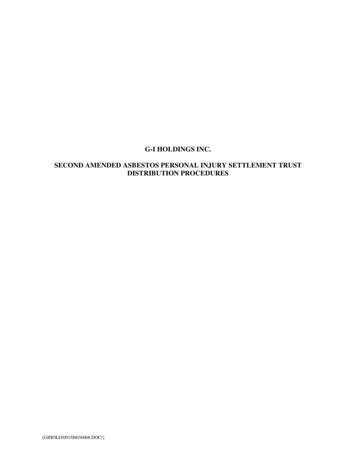
Transcription
Government of Western AustraliaDepartment of Mines, Industry Regulation and SafetyTrust accounthandbook for realestate agentsand real estatebusiness agentsJanuary 2020
Trust account handbook for real estate agents and real estate business agentsThis publication was produced by the Department of Mines, Industry Regulation and Safety. The producers of this publication expressly disclaim any liabilityarising out of a reader’s reliance on this publication.This booklet contains general information that was current at the time of publication. If you have specific enquiries about matters relating to your situation thenyou are strongly urged to seek independent professional advice.This publication is available in other formats on request to assist people with special needs.
Trust account handbook for real estate agents and real estate business agentsContentsIntroduction.Further information.22Part 1. Trust accounting.1:1What is trust money?.1:2What is meant by trust accounting?.1:3Why are there special requirements within the Act for the control of trust money?.1:4What are the types of trust accounts?.Trust accounts.Interest bearing trust accounts.1:5Titling of trust accounts.Trust accounts.Interest bearing trust accounts.1:6Opening, closing and amending trust accounts.1:7Receiving and depositing trust money.1:8What trust documents and records must be maintained?.1:9How long must trust records be retained?.1:10What use is made of the documents and records?.1:11What must an agent do on becoming aware that a trust account is overdrawn?.1:12Fees and disbursements.1:13Trust accounting software.333333444555566777Part 2. Trust documents and records.2:1Basic principles of trust accounting.2:2Trust receipts.Trust receipt process.Contents of trust receipts.Interim receipts.2:3Trust account withdrawals.2:4Cash receipts journal and cash payments journal.2:5Balancing a trust account at the end of each month.2:6Buffer account.888891010101111Part 3. Trust account audits.3:1What are the annual duties of an agent regarding trust account audits?.3:2What are an agent’s duties in appointing an auditor?.3:3What are an agent’s responsibilities to the auditor?.3:4What are the duties of an auditor?.3:5How should an agent respond to an auditor’s recommendations?.3:6What are an agent’s duties in changing an auditor?.12121213131414Part 4. Other relevant compliance matters.4:1What if a real estate agency closes?.4:2Unclaimed trust money.4:3What must an agent do on becoming aware of fraud or theft?.4:4“Off-the-plan” properties.The Sale of Land Act.The Strata Titles Act.15151616161717Glossary.191
Trust account handbook for real estate agents and real estate business agentsIntroductionAll real estate agents and real estate business agents who hold or receive money on behalf of othersrelating to a real estate transaction in Western Australia are required to open and maintain trustaccounts. The Real Estate and Business Agents Act 1978 (the Act) and the Real Estate and BusinessAgents (General) Regulations 1979 (the Regulations) require the strict maintenance of a formalset of trust account records that show at any time the state of a real estate agent’s trust account.Section 70 of the Act requires persons who carry on business as a real estate agent to have theirtrust accounts audited according to the requirements determined by the Commissioner for ConsumerProtection and in accordance with accepted auditing practice.This publication is not a comprehensive accounting text for agents. Familiarity with the content ofthis publication does not satisfy the requirement that agents have a sound working knowledge of theAct, the Regulations and the Real Estate and Business Agents and Sales Representatives Code ofConduct 2016 (the Code).It is the view of the Department of Mines, Industry Regulation and Safety – Consumer ProtectionDivision (Consumer Protection) that section 87 of the Act can be interpreted as meaning that, if thetrading body corporate or firm has failed to comply with the requirements of Part VI of the Act, thenthe directors/partners and/or person in bona fide control of the trading entity have also failed tocomply with Part VI of the Act.Reference material and the latest Consumer Protection requirements can be found on its website.Visit: tate-agents-and-sales-representativesFurther informationCopies of this publication can be accessed from the Consumer Protection website cations-real-estateReal Estate Industry e-Bulletins are used to inform industry about policy and best practice, and maybe used to convey information about the Commissioner’s auditing requirements.Archived issues of Consumer Protection’s Real Estate Industry e-Bulletins are cations-real-estate2
Trust account handbook for real estate agents and real estate business agentsPart 1. Trust accounting1:1What is trust money?Trust money is money received or held for or on behalf of another person in relation to a realestate transaction, business sales transaction or property management transaction. Moneyscollected by an agent for or on behalf of a strata company are also deemed to be moneyscollected by the agent in respect of a real estate transaction.Section 68(1) of the Act requires every licensee holding a current triennial certificate to maintainone or more trust accounts exclusively for the purposes of the Act.Licensed agents have important legal and fiduciary responsibilities in relation to themanagement of a trust account. The removal of money from a trust account for reasons otherthan a lawful purpose is a criminal offence.A separate set of accounting records should be kept for each trust account. Where multipletrust accounts are held, a consolidated set of accounts should also be maintained to assist theaudit process.Reference: sections 67 and 68 of the Act.1:2What is meant by trust accounting?Trust accounting is the general term used to cover the accounting records and practicesrequired under the Act to enable agents to properly account for trust money in their possession.All moneys paid to an agent in trust in respect of a real estate or business transaction mustbe paid into and held in the agent’s trust account which is to be held with an authorisedfinancial institution.Reference: section 68(1) of the Act and regulation 6D of the Regulations.1:3Why are there special requirements within the Act for the control of trust money?Financial institutions holding agents’ trust accounts are required under the Act to pay theinterest on these accounts to Consumer Protection, as prescribed by the Act and Regulations.The interest earned on trust accounts is credited to the Fidelity Guarantee Account and to theGeneral Purpose Account which funds various functions performed by the Commissioner underthe Act and in relation to the Act under the Fair Trading Act 2010, including education, adviceand the investigation of real estate matters.Reference: section 68B(1) of the Act and regulation 6F of the Regulations.1:4What are the types of trust accounts?Trust accountsA trust account is used exclusively for money received or held by a real estate agent for or onbehalf of another person in relation to a real estate transaction and is not to be used to holdmoneys for any other purpose.An agent may have one trust account for all money received by the agent or have separate trustaccounts for sales, rental, business and strata transactions.3
Trust account handbook for real estate agents and real estate business agentsInterest bearing trust accountsSection 68A of the Act allows agents to open separate interest bearing trust accounts forindividuals if a request is received in writing from the person paying the money and occursbefore settlement.Where the transaction relates to the sale of real estate or a business, before an agent cancomply with a request for an individual interest bearing trust account, it must satisfy one ofthe following prescribed requirements: the amount of moneys paid to the real estate agent exceeds 20,000; or the transaction in respect of which moneys are paid is not to be settled within 60 days(regulation 6E of the Regulations).Interest earned on a separate interest bearing trust account must be paid to the personrequesting the account, not to Consumer Protection.Agents must comply with such requests where the aforementioned criteria are met and retainthe written request in their files for auditing purposes.When opening an interest bearing account for a client, the client should be advised to providethe bank with their tax file number to avoid tax being withheld at the top marginal rate.Reference: section 68A of the Act and regulations 6D and 6E of the Regulations.1:5Titling of trust accountsThe titling of trust accounts enables easy identification of real estate trust accounts foragents, auditors, financial institutions and Consumer Protection. Regulation 6D of theRegulations requires an agent to designate their trust accounts in a prescribed manner.Examples of the titling of various categories of trust accounts are provided below.Trust accountsThe title of a trust account needs to contain: the description ‘REBA Trust Account’; the name of the holder of the triennial certificate, and any business name of that holder asrecorded by the Commissioner; and the letters ‘TC’ followed by the agent’s triennial certificate number.Examples of titles for typical general trust accounts for real estate agents areshown below.Sole traderREBA Trust Account – Mary Smith T/A ABC Real Estate – TC12345PartnershipREBA Trust Account – Mary Smith and Bill Jones T/A ABC Real Estate – TC12345Body corporateREBA Trust Account – ABC Pty Ltd T/A ABC Real Estate – TC123454
Trust account handbook for real estate agents and real estate business agentsInterest bearing trust accountsThe title of an interest bearing trust account (IBTA) needs to contain: the description ‘REBA Trust Account – IB’; the name of the holder of the triennial certificate, and any business name of that holder asrecorded by the Commissioner; the words ‘in trust for’ followed by the name of the person who requested the separateaccount; and the letters ‘TC’ followed by the agent’s triennial certificate number.The example below shows a title for a typical separate interest bearing trust account:REBA Trust Account – IB – ABC Pty Ltd T/A ABC Real Estate in trust forJoe Smith – TC12345Reference: regulation 6D of the Regulations.1:6Opening, closing and amending trust accountsWhen a trust account is opened, closed, or amended, agents must advise the Commissionerin writing as soon as practicable.The notification should provide: the name and number of the trust account; the name and address of the authorised financial institution where the trust account is orwas maintained; and the date on which the change was made.You can download a form for this purpose from Consumer Protection’s website ting-real-estate-agents-forms-andpublicationsThe Commissioner does not need to be advised about the opening, closing, or amending ofinterest bearing trust accounts; however these accounts must be audited.Reference: section 68C(1)and (2) of the Act.1:7Receiving and depositing trust moneyAll trust money must be deposited in the trust account with an authorised financial institutionas soon as practicable after it is received. It is the view of Consumer Protection that, ‘as soonas practicable’ means by close of business the next working day.Reference: section 68(1) of the Act.1:8What trust documents and records must be maintained?Section 77 of the Act requires, for the purposes of an audit or report, that agents produce tothe auditor their books and all papers, accounts, documents, and securities, in any wayrelating to any trust moneys received by the agent in their possession, custody or power. Itis essential that copies of the following records are maintained and can be produced at therequest of the agent’s auditor or an investigator/compliance officer of Consumer Protection.5
Trust account handbook for real estate agents and real estate business agentsTrust documents and records that should be maintained include: a record of money received for or on behalf of any other person; trust receipt books register; duplicates of every completed trust account deposit form; trust account journals; trust ledgers; trust cheque books’ register; records of trust money payments; bank statements of trust moneys; register of securities; trust account reconciliation statements; requests for the issue of bank cheques; requests for the opening of separate interest bearing trust accounts; and any other books, accounts or records kept by an agent relating to trust money.It is also recommended that back-up copies of computer records be retained offsite. Thisensures the agent has access to the records in the event of error, falsification of records by anemployee or physical damage to the system.Reference: sections 69(1)(b) and 77 of the Act.1:9How long must trust records be retained?When an agent receives money for or on behalf of any other person, they must keep a writtenrecord of the money received. All trust records and documents are to be retained for aminimum period of six years from the date the money was received and be readily accessible.Reference: section 69 (1)(b) of the Act and regulation 6H(1) of the Regulations.Agents should be mindful of taxation legislation with respect to the requirement toretain accounting records. Agents who are a body corporate should also be aware of therequirements of the Corporations Act 2001 with respect to record keeping.1:10 What use is made of the documents and records?Section 70 of the Act requires an annual audit of every agent’s trust accounts.An audit is an examination by an independent person of the accounts held by an agent. Unlessthe Commissioner approves otherwise, a registered company auditor must conduct the audit.An agent needs to maintain all documents and records relating to a trust account in a mannerthat enables them to be conveniently and properly audited by the agent’s auditor and furnish theauditor with all such information and particulars as he or she reasonably requires.The documents and records listed at 1.8 above enable the tracking of trust money held byan agent at any time in order to verify that money has been dealt with in accordance with theAct. The auditor will conduct a sample-based audit of the records when performing the annualaudit. As well as the annual audit, the Commissioner may order an inspection of trust accountrecords or an interim audit of an agent’s trust accounts at any time.Where for any reason the triennial certificate of an agent ceases to have effect under the Act, atermination audit of the agent’s trust account is required.Reference: sections 70, s.68(6) and s.77 of the Act.6
Trust account handbook for real estate agents and real estate business agents1:11 What must an agent do on becoming aware that a trust account is overdrawn?Section 68C(3) of the Act requires the financial institution and the agent to inform theCommissioner in writing whenever a real estate agent’s trust account is overdrawn.Regardless of the amount overdrawn or whether the overdrawn amount is a result of a bankerror, the Commissioner must be notified in writing as soon as is practicable.The notification should include the date the trust account was overdrawn, the amountinvolved, the reason it occurred and full details of any action taken to correct it.It is best practice for the agent to also notify the appointed auditor of the overdrawn amount.Reference: section 68C(3) of the Act.1:12 Fees and disbursementsA real estate agent is not entitled to receive any commission, reward or valuable considerationin respect of his services in that capacity unless he has a valid appointment to act in thatcapacity which is in writing, signed before the services are rendered, by the client for whomthe services are to be provided.Under section 68(4) of the Act, moneys received by an agent for or on behalf of anotherperson in respect of a transaction shall not be withdrawn from a trust account except for thepurposes of the transaction or as otherwise authorised by the Act or by the person or personslawfully entitled to the moneys.An agent is required to transfer any entitlement gained from a real estate transaction, fromthe trust account to the agency’s general account before using that entitlement to meetgeneral operating expenses. The agent should not pay general operating expenses or personalexpenses directly from the trust account. As best practice, fees should be transferred to theagent’s general account at least weekly but only after the agent is entitled to draw the fees.Reference: sections 60 and 68(4) of the Act.1:13 Trust accounting softwareThe requirements of the Act and the Regulations apply to all computerised trust accountingsystems. Before obtaining software to create and maintain trust account records and producereports, an agent should check the software is capable of producing trust records that complywith the requirements of the Act.Agents should consider discussing the software they are contemplating using with theirauditor to ensure it is able to maintain and generate the required records.Consumer Protection does not approve of or endorse any particular software package andany claims made by suppliers that approval has been granted could be a misrepresentationand should be reported to Consumer Protection.Whilst many agents delegate the day-to-day maintenance of trust account records tooffice staff, it is important for the licensed person in bona fide control of the agency to befully conversant with the computer systems used. This is a requirement of the supervisionobligations found in Rule 14 of the Code. Full use should be made of any checks and controlsthat are integrated into the system and daily reports should be produced for checking bythe person in bona fide control. Discrepancies and errors should be noted and checked andany irregularities immediately addressed, with the relevant records then kept for review bythe auditor.Reference: Rule 14 of the Code.7
Trust account handbook for real estate agents and real estate business agentsPart 2. Trust documents and recordsThe prescribed requirements for trust accounts are explained in this section. Where needed,a model that meets the requirements of the Act is shown. It should be understood, however,that models serve only as examples. While legislation prescribes the information that must berecorded, it does not prescribe the way that information must be presented.2:1Basic principles of trust accountingTo aid in keeping full and accurate records, it is helpful for the agent to adhere to a numberof basic trust accounting principles, which include that: accurate records are kept for all transactions and are written up by the end of the nextbusiness day; each client must have a separate trust ledger account and each individual trust ledgeraccount must never go into debit; trust money is banked by close of business of the next business day where practicable,and in the same form it was received (i.e. cash received must be banked as cash); client funds held in a particular trust ledger have cleared before drawing againstthose funds; unidentified deposits to the trust account are immediately followed up; unpresented trust cheques are followed up and presented as soon as practicable; appropriate authorisation is held for any transfer journal entries; address and adjust journal entries for any errors or discrepancies as soon as possibleand make detailed notes to assist in the annual audit; trust account reconciliations are completed at least monthly and should be completedmore often where recommended by the auditor and/or the volume of transactionsso dictates; trust account reconciliations are completed as at the end of the last day of each monthand signed by the licensed person in bona fide control; fee entitlements should not be transferred from the trust account to the general accountuntil after settlement; and back-up computer records are kept offsite.2:2Trust receiptsTrust receipt processWhen a real estate agent receives trust money in person, a receipt must be provided tothe person at the time of making the payment and a record of the transaction maintained,such as providing a duplicate receipt, which contains all of the information in the receipt. Ifa payment is made by cheque through the mail, the receipt should be provided as soon aspossible and a duplicate retained. Whilst a receipt does not have to be issued if the moneyis received by electronic transfer, a record of the money received must be kept.Reference: section 69(1) and (2) of the Act and regulation 6H(2) and (3) of the Regulations.8
Trust account handbook for real estate agents and real estate business agentsContents of trust receiptsIt is a requirement that all trust receipts show the following information: the name of the holder of the triennial certificate, and the business name of the holder, that isrecorded in the register; a number or letter, or a combination of both, in consecutive order that allows the receipt to beuniquely identified; the date on which the money was received; the name of the person paying the money; the amount of money received; a brief description of the purpose of the payment; and if the receipt is handwritten, the name of the person receiving the money evidenced by thesignature of that person.Reference: regulation 6G of the Regulations.When money has been received by electronic transfer, an agent must ensure a record is kept toallow the receipt of the money to be uniquely identified, by including: a number or letter, or combination of both, in consecutive order that allows the record to beuniquely identified; the date the money was received; the name of the person paying the money; the amount of the money received; and a description of the purpose of the payment.The example below demonstrates a general purpose trust receipt format that meets therequirements under the Regulations:ABC PTY LTD ABN 12 345 678 912 T/A ABC Real EstateLicensed Real Estate AgentTrust Account Receipt16 Horizon Street, Perth 6000No: 00001Date ././.Received from .Address .The sum of .For .For and on behalf of ABC Pty Ltd ABN 12 345 678 912Signed .(name of signatory).Cheque .Cash .Total .All receipts should be posted to the cash receipts journal by the next working day.Reference: regulation 6G(b)(c)(d)(e) and (f) and regulation 6H(3) of the Regulations.9
Trust account handbook for real estate agents and real estate business agentsInterim receiptsThe use of interim receipts is not encouraged. However, there are certain circumstances whenan interim receipt may need to be issued (eg when the agent’s printer is out of order). In thesesituations, a duplicate of the interim receipt should be retained in the records and the interimreceipt should be immediately followed by a formal trust receipt cross-referenced to theinterim receipt.When using a manual system to issue interim receipts, cross-referencing information shouldbe included when recording the receipt in the trust ledger and issuing the formal receipt. Ifa computer system is used, the formal trust receipt should be cross-referenced against theinterim receipt in the computer system.2:3Trust account withdrawalsAn agent must ensure that deposited funds have cleared before those funds are drawnagainst. Drawing against a trust ledger account before a deposit has cleared will cause ashortfall in that ledger if the deposit is dishonoured.At no time should a trust ledger account have a debit balance.Reference: section 68(4) of the Act.As a
Trust account handboo for real estate agents and real estate business agents. 2. Introduction. All real estate agents and real estate business agents who hold or receive money on behalf of others relating to a real estate transaction in Western Australia are required to open and maintain trust . accounts. T
